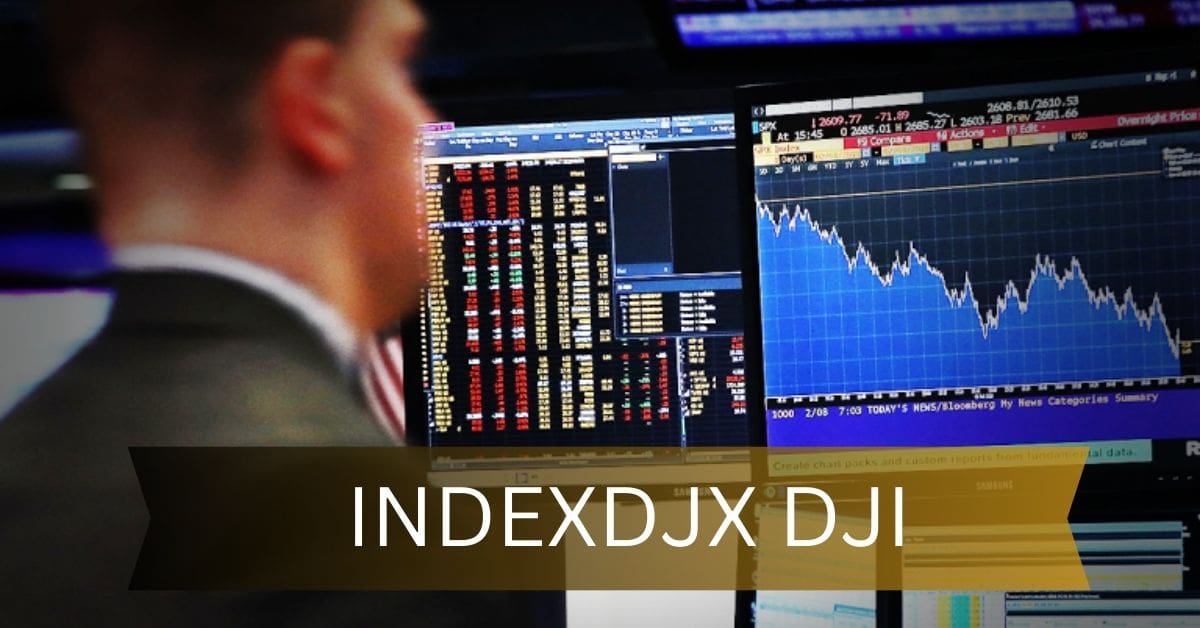
Ever feel overwhelmed by the sheer volume of financial jargon? Trust me, I’ve been there too. When I first heard about the Dow Jones Industrial Average (INDEXDJX: DJI), it sounded like just another complex term in a world of numbers.
I promise, diving into the world of the Dow doesn’t have to be daunting.
The “INDEXDJX: DJI” refers to the Dow Jones Industrial Average, a prominent stock market index that tracks the performance of 30 major publicly traded companies in the United States.
In this post, we’ll explore what the DJIA is, why it’s so important, and how it can influence everything from your investment decisions to your daily news consumption.
What is the Dow Jones Industrial Average?

The Dow Jones Industrial Average (INDEXDJX: DJI) is a stock market index that tracks the performance of 30 major U.S. companies across different industries. Unlike indices that are weighted by market capitalization, the DJIA is a price-weighted index.
This means that the stocks with higher prices have a greater influence on the index’s movement than those with lower prices.
Historical Context – Explore How The Dow Jones Industrial Average Has Transformed Over Centuries!
The Dow Jones Industrial Average, started in 1896 by Charles Dow and Edward Jones, originally included 12 companies mainly from industries like railroads and heavy manufacturing. It gave a basic view of how those sectors were doing.
As America’s economy changed over the years, so did the index. By the early 1900s, it added companies from utilities, transportation, and consumer goods, reflecting these shifts.
The Dow’s history follows important times in U.S. economic history, like the prosperous 1920s, the Great Depression, and recoveries afterward.
It’s known for showing how well the economy is doing and is a big part of the U.S. stock market. Today, it keeps up with new technologies and global trends while staying an important tool for investors worldwide.
Calculation Method of the DJIA – How Price-Weighting Shapes Market Perception and Economic Trends!
The Dow Jones Industrial Average (DJIA) is unique because it calculates its value using a method called price-weighting.
This means it adds up the stock prices of all 30 companies in the index and divides the total by a special number that adjusts for things like stock splits and other changes. This adjustment keeps the index consistent over time, even if one company’s stock price changes a lot.
Since the DJIA gives more weight to stocks with higher prices, those stocks can have a bigger impact on the index’s value.
Critics say this can sometimes make the index seem like it’s moving a lot just because a few expensive stocks changed in price. Despite this, the DJIA is still widely used to show how the U.S. stock market and economy are doing.
The Companies in the DJIA – Explore The Key Players Shaping The Economy!

The Dow Jones Industrial Average (DJIA) is made up of 30 top companies that show how well the U.S. stock market and economy are doing. These companies, called “blue-chip” stocks, are leaders in their industries. They are chosen because they are important, stable, and have a big impact on the economy.
The DJIA includes companies from different sectors like technology, healthcare, finance, and consumer goods. Some well-known companies in the DJIA are Apple, Microsoft, Boeing, Johnson & Johnson, and Visa.
Each company in the DJIA is picked to give a good picture of how the U.S. economy is doing. They are not only leaders in their fields but also have a history of doing well financially. When these companies’ stock prices change, it affects how the DJIA moves.
Investors and experts watch these companies closely because their stock prices can change how people feel about investing and the overall market. The DJIA is an important measure for both regular investors and big investment firms when they decide where to put their money.
Understanding the Significance of the DJIA in Global Finance – Discover why the DJIA matters!
The Dow Jones Industrial Average (DJIA) is a very important measure in global finance for several reasons. It’s one of the oldest and most well-known stock market indices, tracking how 30 major U.S. companies are doing.
It tells us about the overall health of the economy. Investors, economists, and the media watch its daily ups and downs closely to understand how people feel about the market and the economy.
The DJIA has been around since 1896, created by Charles Dow and Edward Jones. It has survived many economic ups and downs, showing it’s a reliable way to see how well big companies are doing and how confident investors are feeling.
The DJIA doesn’t just show numbers; it affects how investors think and make decisions. If it goes up, people often feel optimistic and may invest more.
If it goes down, it can worry people about the economy slowing down or facing problems. It also gives us insights into how different industries like tech, finance, and healthcare are performing, which helps us understand the overall market better.
How To Invest In The Stock Market – A Comprehensive Guide To Getting Started!
Investing in stocks can be a great way to grow your money over time, but it requires careful planning and understanding. Here’s a simple guide:
- Learn the Basics: Start by understanding what stocks are and how the stock market works. There are many beginner-friendly resources online and offline to help you.
- Set Financial Goals: Decide why you want to invest—whether it’s for retirement, education, or other goals. Your goals will shape how you invest and how much risk you can take.
- Financial Foundation: Before you start investing, make sure you have a budget and an emergency fund. Only invest money you won’t need in the short term.
- Open a Brokerage Account: You’ll need a brokerage account to buy and sell stocks. Choose one that suits your needs, with low fees and good customer support.
- Diversify Your Investments: Spread your investments across different types of stocks, industries, and even countries to reduce risk. You can also consider ETFs or mutual funds for diversified exposure.
- Monitor and Adjust: Keep an eye on your investments regularly. Stay informed about the market and company news. Adjust your investments as needed to stay on track with your goals.
- Stay Patient and Stick to Your Plan: Investing is for the long term. Avoid reacting to short-term market ups and downs. Stick to your plan and be patient with your investments.
Following these steps can help you navigate the stock market wisely and work towards your financial goals over time.
How To Pick Individual Stocks – Discover Expert Tips And Begin Your Journey!
To pick stocks wisely:
- Research Companies: Study companies thoroughly. Check their financial health, growth potential, and management.
- Understand the Industry: Know the sector’s trends and competition. Different industries have different risks and rewards.
- Use Financial Metrics: Look at numbers like P/E ratio and debt levels to judge a company’s value and health.
- Evaluate Management: Strong leadership and ethics are crucial for long-term success.
- Assess Growth and Value: Consider how much a company can grow and if its stock price reflects its worth.
- Diversify and Monitor: Spread your investments across different sectors to reduce risks. Keep an eye on your stocks and adjust as needed.
Specific Advice On Buying Or Selling Stocks – Essential Tips For Buying And Selling Stocks!

When you’re buying stocks, it’s important to follow these tips: First, do your homework. Check out the company’s finances, how much money it makes, who runs it, and how it compares to others in its industry. Second, know your comfort level with risk. Figure out how much up-and-down you’re okay with in your investments.
Third, spread out your investments. Don’t put all your money into just one company or type of business. This helps lower your risk if something goes wrong in one area.
Fourth, think long-term. Instead of worrying about short-term ups and downs in the stock market, focus on companies that have good potential to grow over time.
Fifth, keep an eye on your investments. Check regularly to see how they’re doing compared to your goals. Economic changes and news about companies can affect how well your stocks are doing.
Lastly, consider talking to a financial advisor. They can give you personalized advice based on your situation and help you manage your investments wisely. These steps can help you navigate the stock market with more confidence.
Frequently Asked Questions (FAQs):
1. What factors influence the DJIA’s movement?
The DJIA is influenced by company earnings reports, economic data releases, geopolitical events, and investor sentiment. Changes in the stock prices of its 30 component companies have a direct impact on the index.
2. How can I invest in the DJIA?
Investors can gain exposure to the DJIA through index funds or ETFs that track the performance of the DJIA. One popular option is the SPDR Dow Jones Industrial Average ETF (DIA).
3. Why is the DJIA called a “barometer” of the economy?
The DJIA is often referred to as a barometer because its performance is seen as indicative of the overall health of the U.S. economy. Its movements reflect the market’s response to economic news and trends.
4. Is the DJIA the best indicator of the stock market?
While the DJIA is widely followed, it is not the only indicator of market performance. Other indices, such as the S&P 500 and the Nasdaq Composite, provide broader measures of the market and are often used alongside the DJIA to gauge market trends.
Conclusion:
The Dow Jones Industrial Average, or DJIA, continually changes to reflect the economy’s shifts accurately. It remains crucial as a financial gauge, summarizing how key U.S. companies are performing.
Whether you’re investing, analyzing finances, or just curious about the economy, the DJIA offers valuable insights into market trends and economic well-being.